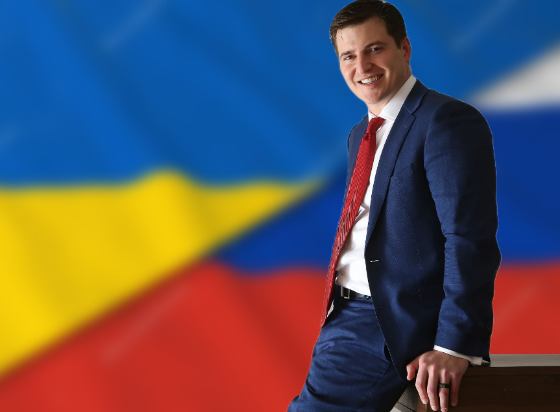As Henry Kissinger turned 100 and Americans marked the arrival of summer with a holiday meant to memorialize our war dead, Europe stood at the abyss.
The Russian invasion of Ukraine is the continent’s largest conflict since the end of World War II. And it’s an existential struggle for Europe, according to John Mearsheimer, the controversial scholar many consider the dean of U.S. foreign-policy realists.
Kissinger might dispute that title. But while Kissinger has devoted himself to practice, Mearsheimer won renown as a theorist, notably with his 2001 book “The Tragedy of Great Power Politics.”
Mearsheimer also received obloquy for his 2007 book “The Israel Lobby and U.S. Foreign Policy,” co-authored by Harvard’s Stephen Walt.
More recently, Mearsheimer outraged supporters of Ukraine with comments pinning much of the responsibility for Russia’s invasion on American policy.
Expanding NATO after the Cold War, and holding membership open to Ukraine, inflamed Russian fears, he argues. And he rejects the idea that Putin has grand designs to rebuild the Soviet empire.
But when Mearsheimer recently came to Washington, D.C., his topic was not the war’s origins but its stakes and likely outcome. He spoke as a realist, and the reality as he sees it is that every party to the fight has reason to perceive it as an existential struggle.
In Ukraine’s case, that’s obvious — it’s fighting for survival.
Yet that means more than just resisting obliteration. Kyiv’s objectives are to reclaim all of its sovereign territory and make sure Russia cannot resume aggression in the future.
Anything less would be only a temporary reprieve.
Mearsheimer reiterated his argument that the Russians believe their existence as a great power is jeopardized by NATO’s growth. If Ukraine possesses Crimea and gets admitted to NATO, Russia loses reliable access to the Black Sea and Mediterranean beyond it.
For the czars, Soviets and Putin alike, Crimea has been a vital security interest.
Putin’s aim, in Mearsheimer’s estimation, isn’t the total conquest of Ukraine. That would be like “swallowing a porcupine.” The Ukrainian population as a whole is simply too large and too hostile for Russia to absorb the full country.
But Russia will continue its war of attrition until it secures the oblasts it has occupied so far. And Mearsheimer thinks Moscow wants four more oblasts after that, until Russia controls more than 40% of Ukrainian territory.
Seizing Odessa and cutting Ukraine off from the Black Sea is also an objective. Russian victory means a mutilated, unstable, commercially isolated, undefendable Ukraine.
For all his criticisms of U.S. policy before the invasion, Mearsheimer sees no way for the U.S. and Western Europe to back down now. For them, too, the war is existential.
European security depends on NATO. If the West invests everything it can in Ukraine, short of direct military intervention, and Russia still wins, confidence in NATO will shatter.
That doesn’t mean Russian armies march onward. What Mearsheimer foresees is rather the disintegration of NATO from within, a loss of strategic cohesion that allows Russia and China to play different European nations, and different factions within those nations, against one another.
As for the United States, our leaders see Ukraine as a harbinger of what’s to come in East Asia. Mearsheimer has always been a China hawk. He argues a rival hegemon in East Asia would constrain our freedom of action and injure our commercial and strategic interests.
If the U.S. can’t protect Ukraine from Russia and uphold NATO’s credibility in Europe, what chance would we have to save Taiwan from China or to sustain our alliances in East Asia?
Mearsheimer was in Washington to talk to the Committee for the Republic, a group founded by the late C. Boyden Gray, William Nitze (son of Cold War strategist Paul Nitze), and others to oppose the hawkish drift of U.S. foreign policy at the time of the Iraq War.
Yet Mearsheimer’s analysis contained little to comfort doves.
He might be wrong.
What would prevent Europe from creating a new security architecture if NATO gets discredited — assuming a loss in Ukraine, if it happens, would indeed discredit NATO?
And can China really hope for hegemony with such large and wary powers as India and Japan in its vicinity?
But Mearsheimer’s grim realism is a reminder of how world wars start.
In a war with a great power, a smaller state’s only hope might be to bring another great power in on its side.
And great powers act out of fears based on perceptions, not simply objective facts.
As the hot dogs grill, we don’t feel like a world war is beginning. But for the English-speaking peoples this is also how the first two began.
Daniel McCarthy is the editor of Modern Age: A Conservative Review. To read more by Daniel McCarthy, visit www.creators.com
COPYRIGHT 2023 CREATORS.COM
















asdf
Bodrum Havuz güler yüzlü ve deneyimli personeli ile yüzme havuzu sektörünün öncülerinden olup, profesyonel anlamda proje ile havuzun alt yapısından başlayarak mekanik, tesisat, çevre düzenlemesi ve servisine kadar bütün aşamalarıyla anahtar teslimi alternatif havuz teknikleri kullanan ender firmalardandır.